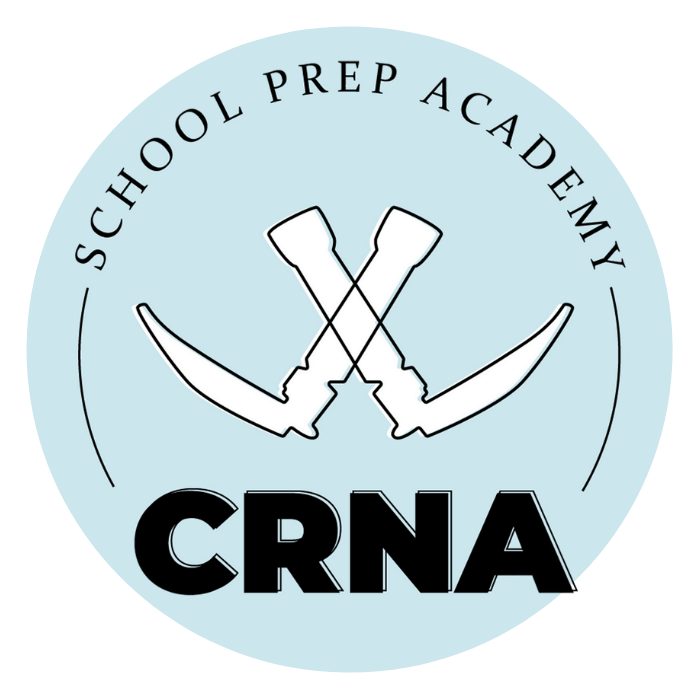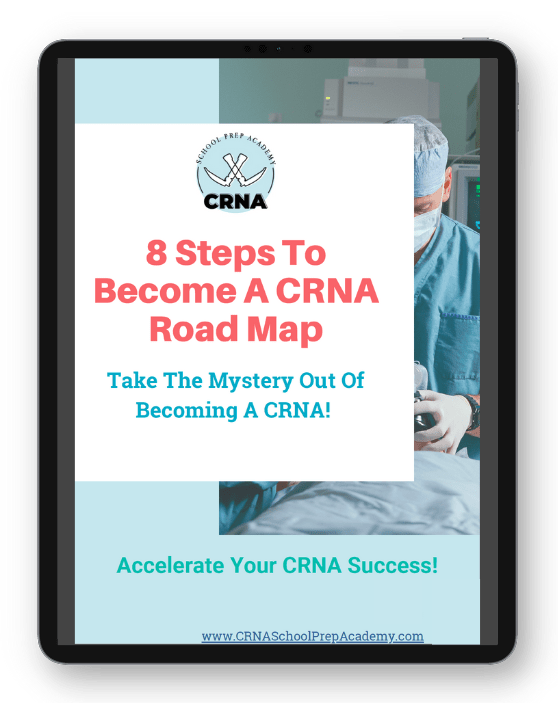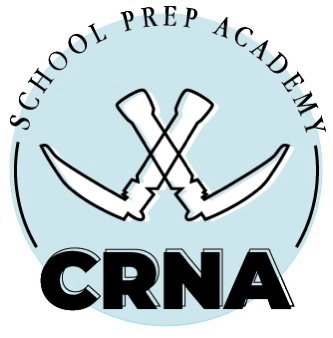
Looking to ace your CCRN? Wondering what the heck the CCRN (Critical Care Registered Nurse) is? Look no further, future CRNA! While not every school requires the CCRN, this certification can help you boost your application and stand out as a highly competitive candidate when applying to school.
In today’s episode, we’re breaking down:
- What is the CCRN, and who needs to take it?
- The hourly ICU experience and qualifications you’ll need to take the test
- What sections you can expect to see (and where to focus your study efforts)
- A pricing breakdown (Spoiler alert- You should NOT “wing” this test)
- How studying the CCRN questions can help you tremendously in preparing for your CRNA school interview
- A breakdown of extra certifications you can pursue to boost your application
Happy testing, and go shine bright, future CRNA!
Ready to rock that CCRN? Check out the incredible study guides and practice questions offered here! https://www.nicolekupchikconsulting.com/?ref=30025
**Disclaimer**
This is an affiliate link, so I do make a small commission if you choose to purchase CCRN prep materials from Nicole Kupchik Consulting!
—
Get access to planning tools, valuable CRNA Faculty guidance & mapped out courses that have been proven to accelerate your CRNA success! Become a member of CRNA School Prep Academy here:
https://www.crnaschoolprepacademy.com/join
Book a mock interview, resume edit or personal statement critique:
Join us at the CRNA School Prep Academy Conference!
https://events.crnaschoolprepacademy.com/
Grab a list of the most affordable CRNA Programs: https://www.cspaedu.com/affordable
—
Watch the episode here
Listen to the podcast here
CCRN And Other Certifications
We’re going to discuss the CCRN. Many of you guys know about the CCRN, or if you don’t, it’s a Critical Care Registered Nurse. It’s a certificate you get for working in ICU. You do have to qualify to be able to take it. We’re going to go over the requirements of that and a little of the ins and outs of the tasks and maybe some things that you don’t know that I want you to know.
I see nurses have numerous certifications, and we’re going to cover that a little bit later on since there are additional certifications you can get other than the CCRN. However, the most common one is a CCRN. Back when I applied to school, the GRE, for the most part, was mandatory at most schools. I know that has changed. Schools have shifted to requiring the CCRN versus the GRE. A lot of schools now will say, “Required of the CCRN.” However, there are still a lot of schools who say, “Recommend the CCRN.” Back to the whole recommendation versus requirements, it is a requirement because of how competitive these schools are. You should get your CCRN.
For those of you guys who are applying to a school with barely nine months of experience, I’m not here to discourage you from doing that. Rock it and do it, by all means. You won’t be able to take the CCRN because, to be able to take it, you have to have over 1,750 hours of direct patient care within the previous two years. If you do the math, that’s full-time as an ICU nurse for two years.
It’s not something that you can get if you barely have a year of ICU experience under your belt, but if your school does not require it and by the time of the interview, you will have met the year minimum of ICU experience or close to it, go for it. I’m not discouraging that at all. Plenty of nurses get in without the CCRN.
Know your overall application is my suggestion because it’s competitive. Most of the candidates are going to have the CCRN who apply. If you think you have something else to bring to the table that can outshine that, by all means, rock it. The CCRN, again, is a great boost in your application regardless of whether it’s required or recommended.
What are the requirements? The requirements are 1,750 hours of direct care within the previous two years of acutely or critically ill adult patients. They do have a NICU and FIDS version of the CCRN. There’s another option that they list as a five-year option. That is, as a nurse or advanced practice nurse, to have five years with a minimum of 2,000 hours of direct care with acutely or critically ill adult patients, with only 144 of those being within the last year that you’re applying.
The CCRN is a great boost in your application regardless of whether it's required or recommended. Click To TweetI also want to back up a little bit, too, sorry. I forgot this. The whole 1,750 hours of direct care within the last two years, only 875 hours accrued, and the most recent year prior to applying. You could potentially have ICU experience, leave the ICU, come back to the ICU and take your CCRN. That’s what that means. It’s the same thing with the five-year option. You could technically have ICU experience, leave the ICU, and come back to the ICU for a short period of time only. After 144 hours of current ICU experience, you can sit for your CCRN. That’s what that means.
On the AACN website again, if you’re not familiar with AACN, it’s the American Association of Critical-Care Nurses. I highly recommend that you become a member of the AACN. They not only offer great educational workshops, if you’re a critical care nurse, it’s the association you want to be a part of. It shows leadership skills. I encourage you to try to get involved in the AACN if possible, but at the bare minimum, you should at least be a member as an ICU nurse.
Based on their criteria, they want your ICU experience to be in the US, Canada, or a comparable US standard of ICU. It is what they require. They have all this information on their website, but I figured I’d save you guys some steps here, and I’ll tell you some of this. They also have a helpful handbook of the CCRN that gives you all kinds of information. They’ll divide up the test into different categories and tell you, within those categories, exactly what topics they are going to test on. It’s probably overwhelmingly detailed, but it’s a nice place to start if you’re wondering what you’re going to be asked as far as what test questions you are going to get.
They also give you eight practice questions. It’s only eight questions, but it still never hurts to go over those eight questions. They give you answers to those questions too. The CCRN has a total of 150-questions. It’s a proctored test. You’d have to go to a testing facility to take it, and they only score 125 of those questions. Passing is passing with an 83. You have to get 83 correct questions out of 125 scored questions to pass the test. That’s only equivalent to 66%.
They’re pretty lenient as far as what the passing score is. This is what I want you guys to know because most people don’t know this when they take the CCRN is that some schools want to know your score. Not all schools, but some schools will. It’s nice to know this prior to taking the CCRN. That’s why I’ve always stressed you guys to research your school early if you want to get to know your school early on. If you don’t know what school you’re going to apply to, research at least a handful of them to get to know what their requirements are and what the recommendations are.
If you don’t know where you are going to be applying, make sure you keep track of your score, and you save that information somewhere because some people are scrambling when they’re applying. They’re trying to figure out how to contact the AACN to ask “How can I find out my score? I don’t remember what my score was. I didn’t keep that piece of paper. I didn’t keep the email.”

Little tidbit, print it out, put it in a file cabinet, and file it away. Another thing is some people are like, “What if I barely passed?” They don’t have to know that, but if they want to know the score, they’re going to know. There’s no way around that. If you barely pass and they’re not going to ask you for your score, it doesn’t matter. You pass. You have the certificate. It doesn’t matter what you score, but it does matter if they want to know.
Long story short, without me preaching to the choir, I’m telling you guys to make sure you’re studying for this test. Don’t take it lightly. A lot of people were like, “I’ll wing it and see what happens. If I don’t do well, I’ll take it again.” It was expensive. The price is $245 for a member of the AACN and $360 for a non-member.
Why would you ever wing this test? Do not do that. Save your money. That can buy a lot of stuff. I highly recommend that you take this seriously and that you study. There are all kinds of great resources out there to study from. Laura Gasparis has a great program, and so does Nicole Kupchik, Magoosh and Kaplan. There are tons of great resources out there. I don’t think you need more than one. I think you pick one and utilize it as much as you can.
I still have it. It’s Kaplan. That’s just questions. That’s all I did. I read this book of all these different questions, and not that they were just questions, but it broke up into sections and gave me study material along with questions per section. Don’t kill yourself over getting multiple things to practice from. Pick one and do it well. You’ll be okay. Make sure you do study. Don’t wing it. It was too expensive. If you don’t do well, if you get a score of 83%, and you find out later that your school wants to know your score, don’t do it.
To give you guys an idea, they’ll break up this test into sections. Cardiac, historically has been the most heavy hit section, and that’s 17% of your test. There is an endocrine, GI, renal, that’s 20%. That makes up a lot of different categories. That’s why it’s 20% because they mash a whole bunch of stuff into one section.
If you were to break up all the sections as an individual body parts, the cardiac sections are by far the most heavy hit section. It is something to keep in mind, which I think is great because CRNA interviews tend to focus a lot on cardiac. Every patient has a heart. It doesn’t matter whether you work with SICU, neuro, medical ICU, or anywhere.
Studying for the CCRN is going to also be equivalent to studying for the CRNA school interview. Click To TweetAll your patients have a heart, and the heart plays an important role in any critically sick patient. That’s heavily hit in the CCRN. Studying for the CCRN is going to also be equivalent to studying for the CRNA school interview. Not all CRNA interviews hit heavy clinical, but you can’t go wrong from studying some CCRN material prior to your CRNA interview because it’s similar types of questions if they do hit clinical questions.
Other things, I want to go over some other certifications with you guys real quick because I want to open up your eyes that there are other certifications out there. If you’re looking for additional boosters, I have a lot of students who come to me. They get waitlisted, for example. They’re like, “I don’t know how else I can better my application while I’m long waiting.
The other tidbit for the waitlist. I know I went over this in a previous episode, but don’t sit stagnant when you’re on the waitlist. You want to make sure you’re reaching out and asking, “What’s the status?” You also want to try to look for things you could do to add your application. I mean, why not? It’s only going to help you.
You’d be surprised that the vast majority of people who would get waitlisted don’t ever follow up with the school. You want to not only be falling back to the school to figure out what you can improve upon, but it wouldn’t hurt to get, like maybe your CMC, CSC, or some other certification and submit it. It’ll give you that little extra boost you need to have and be like, “This applicant didn’t sit still on the waitlist. They are still going to CRNA conferences. They’re still getting the extra certifications.”
That would be impressive. If they had to pick someone randomly off the waitlist and saw one applicant actively striving to do more, I would think that if they didn’t have an order on the waitlist, they would pick that one or that applicant. Extra certifications. I’m off that ramp. The CMC is the Cardiac Medicine Certification. There was the CSC, which is if you care for post-open-heart patients, 48 hours post-surgical cardiac surgery patients, you can take the CSC.
There’s also the CSRN, Stroke Certified RN. There’s also the TCRN, which is the Trauma Certification. There is something called the RNC-NIC, which is the Neonatal Intensive Care Certification. There’s also the CCRN for PICU and NICU. There is the CEN which is the Emergency Nurse Certification. There is also something that is unique that I don’t think a lot of people are aware of- you can get this, especially the nurses who maybe have cath lab experience or EP lab; the two main areas that I know to gain this experience are the Sedation Nurse Certification and endo will be the other one.

That’s ICU experience, but let’s say you worked in an endo, cath lab, or EP, which is an electrophysiology lab. If you were to pick any of those areas, chances are, you’re getting conscious sedation as a nurse. Get certified and go to the ICU, get your ICU experience, and have your CCRN. That will give you a cutting edge and something unique about your application.
If you have that experience, try to make sure you’re getting these certifications. That sums up for you about the CCRN and maybe any additional certifications. It’s something that you want to have if you can get it, but there is that minimum time requirement to get your CCRN. I hope you guys found that helpful, and you guys all have a good day. We’ll see you next week. Bye-bye.
Important Links
Get access to planning tools, valuable CRNA Faculty guidance & mapped out courses that have been proven to accelerate your CRNA success! Become a member of CRNA School Prep Academy here:
https://www.crnaschoolprepacademy.com/join
Book a mock interview, resume edit or personal statement critique:
Join the CSPA email list: https://www.cspaedu.com/podcast-email
Send Jenny an email or make a podcast request!
Hello@CRNASchoolPrepAcademy.com
Join us at the CRNA School Prep Academy Conference!


